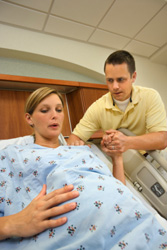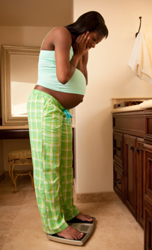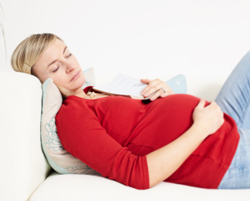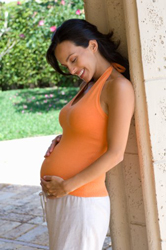CHANGES TO MUM
From your 26th week of pregnancy you should make yourself aware of pre-term labour and the early warning signs. In previous weeks we have discussed Braxton Hicks Contractions and what to expect from these.
However if you happen to experience contractions that come more frequently than 4 in an hour then this can be a warning sign of pre-term labour. Other signs such as watery or bloody discharge or leaking, persistent or rhythmic cramping in the lower abdomen and cramping and lower back ache.
Experiencing any uncomfortable or unusual symptoms should result in contacting your doctor immediately. If you are infact in premature labour your doctor can often take preventative measures to stop the early delivery of your baby. Remember the longer your baby remains in the womb the better the chance of survival.
By 26 weeks of pregnancy your uterus should be just over 6cms (or about 2.5 inches) above your belly button, growing about 1cm each week.
You may have put on anywhere between 7 to 11 kgs by this stage, however keep in mind that your weight does fluctuate and there are many reasons that you may be weighing more than what you expected such as water retention.
Try to avoid checking the scales too often and don’t allow yourself to feel down about your weight gain. your hormones and mood swings are already having a tough time during pregnancy without adding the frustration and disappointment of constantly weighing yourself.
Staying healthy is the most important thing for you and your baby!
As your baby develops your body changes and hormones adjust and adapt. These can affect a variety of behaviours both mentally and physically. After 26 weeks of pregnancy your body is more prone to injury so ensure you stay safe when exercising.
You will find Exercise Information in the “Pregnancy Baby Child” Pregnancy Guide that may help you recognise your limitations.
While you grow you may experience some pain and discomfort, this can often be relived by changing or moving position forcing your baby to also change position. Night time and sleeping can be a real challenge as discussed in previous weeks.
If you haven’t already you may find the use of a pregnancy body pillow a great help and comfort to get you through the nights.
Where possible, if you are feeling tired during the day try to rest or take a short nap. It is also a good idea to get into a routine of resting or sleeping when your baby is.
Your antenatal classes should start very soon if they haven’t already and will help both you and the father prepare for birth and parenthood. No matter if you are a first time mum or you have had children before, these classes can be extremely helpful and allow you access to experienced people to answer any questions or concerns you may be facing.
They are often held by your hospital and allow you the opportunity to see the maternity ward and find out exactly how things are done when you go into labour.
As you enter the later stages of pregnancy your doctor may request to see you more frequently, generally every two weeks.
Your doctor will continue to check you and your baby’s progress including the fetal heart beat, your blood pressure and take a fundal height measurement.
It is not uncommon for your blood pressure to rise from this stage of pregnancy and will be monitored by your doctor.
Anywhere from 26 to 28 weeks of pregnancy your doctor may suggest you have a glucose tolerance test to check the possibility of gestational diabetes. Only about 4% of pregnancies per year are affected by gestational diabetes.
The glucose tolerance test involves a blood test to determine your blood glucose level. Gestational diabetes is caused by your body not being about to create and use all the insulin needed during pregnancy.
Because your baby is fully formed by the time that gestational diabetes is contracted birth defects are not likely, however other issues may occur.
With early diagnosis your doctor will be able to advise you of the changes you should make to your diet and lifestyle that will look after both you and your baby.
CHANGES TO BUB
At 26 weeks of pregnancy your baby will measure approximately 36cms in length if he/she had their legs extended and weigh about 760 grams.
The genitals of a boy and girl will look completely different by this time and it will be very obvious on an ultrasound what you are having. If your baby is a boy, testosterone-producing cells in the testes increase in number. The testicles of a baby boy start to descend into the scrotum at this stage of the pregnancy, this is usually complete within two to three days.
Still very active your baby may even respond to touch, try rubbing your belly to sooth or tapping to get a response. Sounds also can provoke a response from your baby, calming him/her with your voice or jumping in reaction to a loud noise.
Neural pathways within the ears are developing during pregnancy from 26 weeks. While your uterus is thought to be a quiet place, your baby has been hearing the sounds from within your body for a long time now. Think of all the noises that your baby can hear such as your heart beating, your blood flowing and your digestion gurgling.
Your baby’s lungs continue to develop and start to secreate a substance called surfactant which covers the inner lining of the air sacks, this will help your baby’s lungs expand at birth.
By 26 weeks of pregnancy your baby’s skin has lost the translucent appearance it had before and is now opaque and reddish. It remains wrinkled looking as your baby still hasn’t built up enough fat deposits.

















